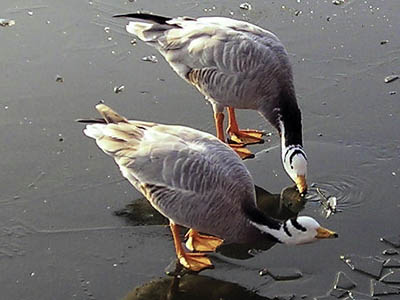
Geese are among species affected by the freeze. Photo: Jim Linwood
Conservation bodies are appealing to walkers to keep bird disturbance to a minimum as temperatures plummet.
Birds need to conserve energy during freezing spells as food becomes harder to come by. Unnecessary disturbance by walkers and paddlers could have dire consequences for waders and fowl.
The Royal Society for the Protection of Birds made the plea for the first time in more than a decade as the prolonged cold spell started to affect wildlife across the country.
The British Trust for Ornithology, the Wildfowl and Wetlands Trust and Natural England all backed the plea.
Birds particularly at risk are ducks, geese, swans and other wading birds such as godwit, knot and dunlin. This is the first time for years such an appeal has been made in England, milder winters having prevailed recently. A similar plea was made, however, in Scotland in 2003.
Dr Mark Avery, the RSPB’s conservation director, said: “During freezing conditions disturbance forces the birds to squander their precious energy reserves by taking flight when they need to spend as much time as possible feeding.
“Although we haven’t made this appeal since 1997, we hope everyone who uses the countryside will heed our advice, allowing the millions of birds which visit the UK’s coasts and wetlands during the winter to stand a better chance of survival.”
Many of the threatened birds are migratory, visiting Britain during winter.
Dr Andre Farrar, the RSPB’s protected-area campaigner, said: “Even at a time when our climate is warming, we can still expect freezing conditions, but less frequently.
“Wildfowl and wading birds respond to these icy blasts by moving further south and west. Mild winters have allowed some of these international travellers to cut short their journeys, with more remaining within the eastern half of Britain.
“As the natural world responds to the freeze, we can expect the UK’s vital coastal wetlands to play a role in helping these hardy birds survive the winter.
“If the freeze continues, we can expect the warmer estuaries on our west coast – such as the Severn, Dee, Mersey, Ribble, Morecambe Bay and the Solway – to be especially important as birds escape the weather.
“These are among our most important wildlife sites. The winter of 2009 is likely to show just how vital they are to the survival of thousands of water birds.”
Legislation allows the shooting of some species to be suspended for a fortnight if there are 14 successive days of severe weather, allowing them to recover. This ban was last imposed in 1997.